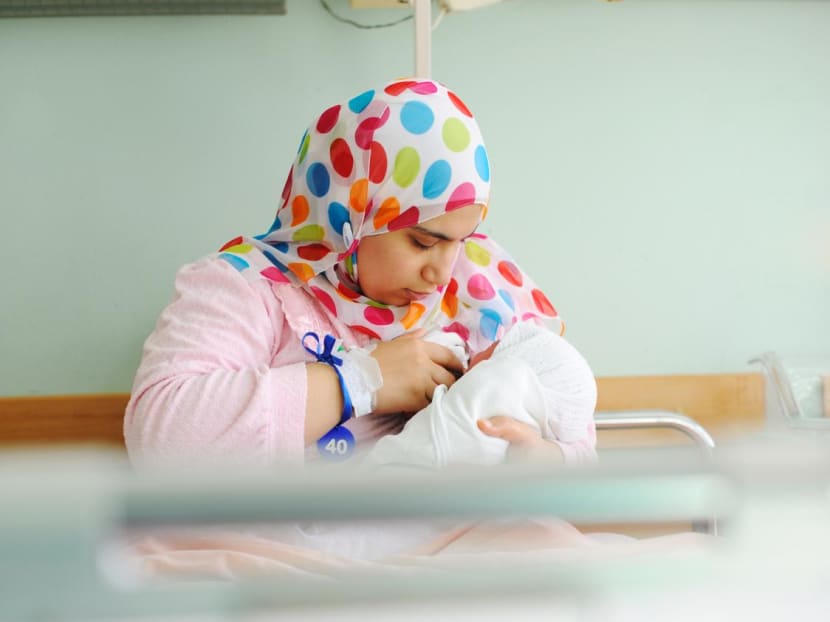Fasting and nursing your baby: How Muslim mothers can breastfeed healthily during Ramadan
To ensure a safe and healthy fast, breastfeeding mums who observe Ramadan should increase their water intake and eat high-fibre foods during their non-fasting hours and get sufficient rest.

Nursing mums must consider their health, as well as their baby’s, before deciding to fast during Ramadan. (Photo: iStock/ZouZou1)
As Muslims approach the halfway mark of the holy month of Ramadan, many may have become accustomed to the daily fast, which requires them to refrain from food and drink from sunrise until sunset.
For some, however, fasting is not as straightforward as it seems. In particular, Muslim women who are breastfeeding may find fasting a considerable challenge, as they must balance the needs of their bodies and their baby’s need for adequate nutrition.
HOW FASTING AFFECTS THE BREASTFEEDING MOTHER AND HER BABY
“When a breastfeeding mother fasts over some time, the nutritional content of the mother’s blood is likely to reduce”, said Dr Mythili Pandi, a family physician and an International Board Certified Lactation Consultant.
She explained that as water is crucial in breast milk production, abstinence from drinking throughout the day can cause a reduction in the amount of milk the body produces, while dehydration may lead to the mother feeling fatigued and exhausted.
Breast milk flow, which is dependent on how comfortable and relaxed a mother feels while nursing or expressing, is also impacted. “Due to hunger and thirst, fasting likely causes emotional distress, like the state of being ‘hangry’,” Dr Pandi explained. Feeling distressed can hinder milk flow.
The quality and quantity of breast milk also affect the baby. Even if the mother appears well, the baby may show signs of agitation and discomfort by crying incessantly – a sign that he or she may not be getting enough milk.
“We can determine how much breast milk the baby is taking in by monitoring the baby’s pees and poos,” Dr Pandi said. “If the usual amount is reduced throughout the day, the baby may not be taking in as much breast milk as the baby should.”
The stage of development the baby is in also plays a part. Dr Pandi explained that after the baby is introduced to solids, usually around six months of age, he or she can rely on other forms of sustenance other than the mother’s breast milk. At this stage, fasting may not pose too many health risks to the baby.

WHAT FASTING MUMS CAN DO
While challenging, fasting and breastfeeding can be done safely with the right amount of preparation and practice.
Dr Pandi emphasised that mothers should “be kind to their bodies”. Don’t fast immediately without prior practice and preparation, and make sure that you’re able to gauge the effects of the fast on your health.
Khatim Hamidon, president of the Breastfeeding Mothers’ Support Group (BMSG), said: “There are ways to take care of the body to fulfil both the fast and breastfeeding.”
Both Khatim and Dr Pandi highlighted the importance of hydration during the pre-dawn meal and after the mother breaks her fast.
Breast milk is 80 per cent water, and the volume of milk produced remains at a close constant when the mother remains hydrated, said Dr Pandi. During non-fasting hours, mums are encouraged to drink at least a cup of water every half-hour and to eat water-rich fruits like watermelon and oranges.
Eating nutrient-dense, high-fibre foods like oats, potatoes and brown rice during the pre-dawn meal and after breaking the fast, also helps sustain the mother’s energy throughout the day.

Fatihatul Insyirah Hafiz, a 28-year-old mum of a two-year-old boy and a four-month-old girl, said that her milk supply is a “significant concern” when she fasts.
This is the third year that she is breastfeeding and fasting during Ramadan: She did so in 2021 and 2022 when her son was seven months old and 18 months old, and this year, she is nursing her daughter.
To overcome the challenges, Fatihatul said she eats energy-sustaining foods, as well as those that help boost milk production: Whole grains like oatmeal, fruits like dates and watermelon, vegetables like carrots and lettuce, and lean protein like skinless chicken breast and yoghurt.
She also drinks at least eight cups of water during non-fasting hours.
However, while she may fast successfully on most days, Fatihatul said she breaks her fast immediately if she experiences dizziness, fatigue, or a dry mouth, to protect her and her children’s health.
“I want the best for my child,” she said, acknowledging that although it is difficult, the preparation to fast and breastfeed safely is worthwhile as it means taking better care of herself and her children.
Dr Pandi also advised nursing mums to avoid strenuous activities and prioritise important tasks to help them feel less tired and put them in a more comfortable state to breastfeed.
To get a better gauge of the baby’s health during the fast, Dr Pandi recommends direct latching. When a baby is nursed from the breast, the mother's body receives information on the baby’s microbiome, such as infections and changes in the gut, where it then responds by producing appropriate breast milk components suited for her baby at that time.
BEING EXEMPTED FROM FASTING

Due to health concerns that fasting may bring about in a breastfeeding mum, some women may be exempted from fasting.
Ustazah Liyana Musfirah Anwar, a religious teacher and founder of Liyana Musfirah Network, a spiritual and social network for Muslim women, said that breastfeeding women are given rukhsah, the Arabic word for ease and concession in religious practice, should they require it.
“Mothers need to make an informed decision when they decide whether or not to fast,” Ustazah Liyana said.
She explained that if fasting while breastfeeding could harm the mother or baby, then the mother should not fast. If a doctor advises the mother against fasting throughout the whole month, it is important to follow the doctor’s medical advice.
Khatim added that as a peer consultant who has met many mothers through BMSG: “Every mother has different strengths and limitations.”
While some mothers may be able to safely fast and breastfeed simultaneously, others may still not be able to do so even after having multiple children.
Every mother's situation is unique, and making comparisons between them is not helpful. “Ultimately, each mother knows what is best for her and her baby,” Khatim said.
Read this story in Bahasa Indonesia here.
Read this story in Bahasa Melayu here.
CNA Women is a section on CNA Lifestyle that seeks to inform, empower and inspire the modern woman. If you have women-related news, issues and ideas to share with us, email CNAWomen [at] mediacorp.com.sg (CNAWomen[at]mediacorp[dot]com[dot]sg).







